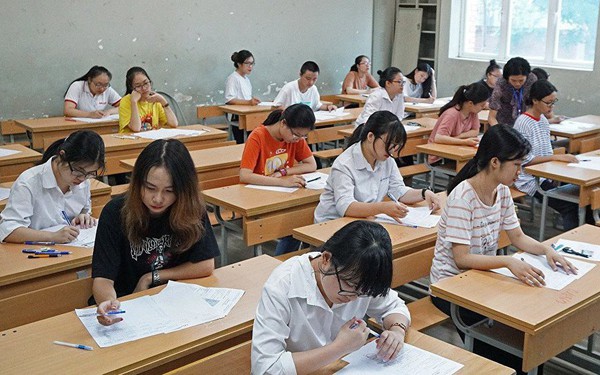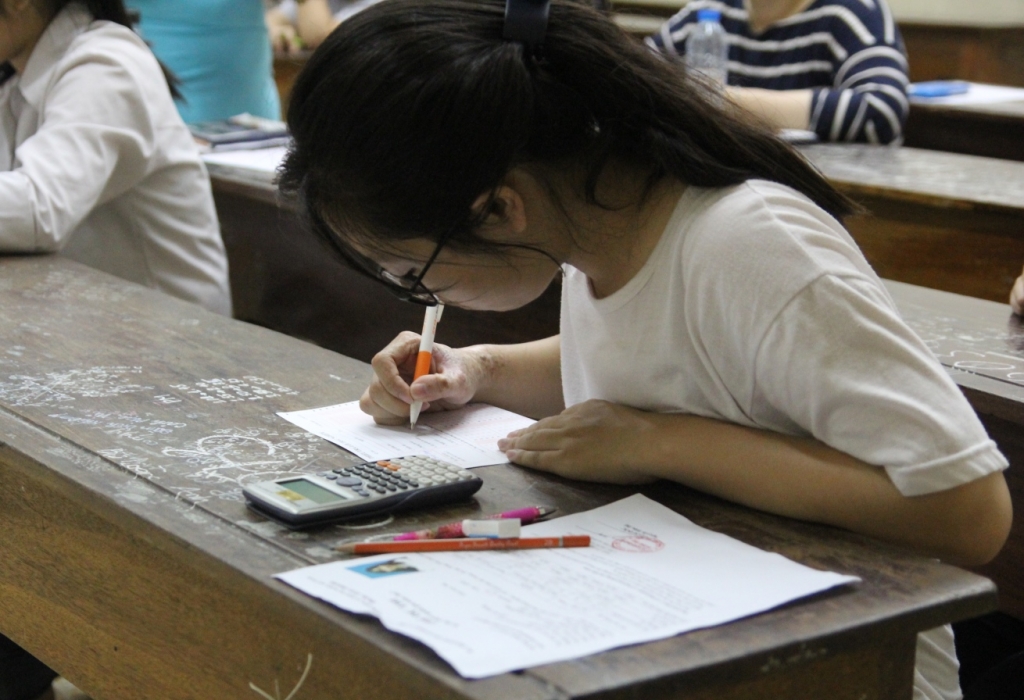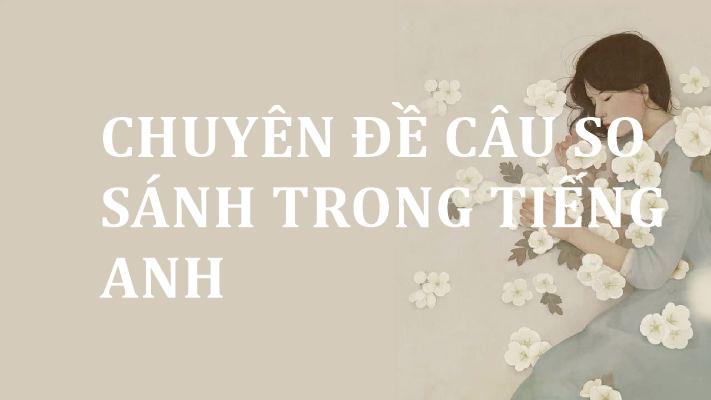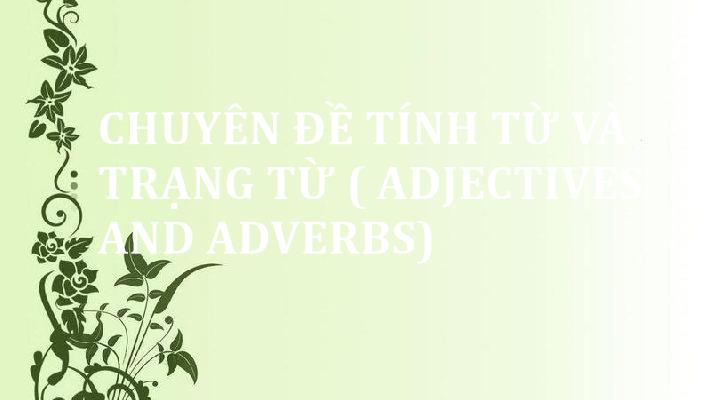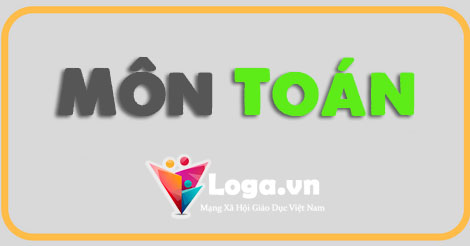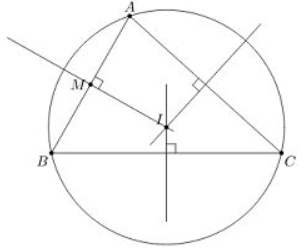Chuyên đề
CÂU GIÁN TIẾP – REPORTED SPEECH
* Định nghĩa:
- Câu trực tiếp (directed speech): sự lặp lại chính xác những từ mà người nói đã sử dụng; lời nói trực tiếp được đặt trong cặp dấu (‘’) hoặc (“”) và sau động từ chính có dấu (,) hoặc (:).
Ví dụ: He said: “What are you doing, Tom?’’.
“You are good-looking!” Mary said to Tim.
- Câu gián tiếp (indirected/reported speech): là lời tường thuật lại ý vủa người nói, nhiều trường hợp ta không thể dung chính xác những gì người nói đã nói.
Ví dụ: He asked Tom what he was doing.
Mary said to Tim that he was good-looking.
I. Những thay đổi trong lời nói gián tiếp.
Khi chuyển từ câu trực tiếp sang gián tiếp, ta cần lưu y những thay đổi sau đây.
1. Thì của câu.
|
|
Câu trực tiếp |
Câu gián tiếp |
|
1 |
Hiện tại đơn |
Quá khứ đơn |
|
2 |
Hiện tại tiếp diễn |
Quá khứ tiếp diễn |
|
3 |
Hiện tại hoàn thành |
Quá khứ hoàn thành |
|
4 |
Hiện tại hoàn thành tiếp diễn |
Quá khứ hoàn thành tiếp diễn |
|
5 |
Quá khứ đơn |
Quá khứ hoàn thành |
|
6 |
Quá khứ tiếp diễn |
Quá khứ hoàn thành tiếp diễn |
|
7 |
Quá khứ hoàn thành |
Giữ nguyên |
|
8 |
Quá khứ hoàn thành tiếp diễn |
Giữ nguyên |
|
9 |
Tương lai đơn |
would + V |
|
10 |
Tương lai tiếp diễn |
would be + V_ing |
|
11 |
Tương lai hoàn thành |
would have + VPII |
|
12 |
Tương lai hoàn thành tiếp diễn |
would have been + V_ing |
→ Vậy, ta thấy rằng có nguyên tắc chung về việc thay đổi động từ: ta lùi động từ 1 thì.
- Riêng các thì tương lai chỉ cần thay đổi: will/shall thành would/should.
- Các “modal verbs”: can → could, may → might, must → had to.
! Chú ý một số trường hợp không cần lùi thì khi chuyển sang câu gián tiếp:
- Khi động từ tường thuật không chia ở quá khứ mà chia ở hiện tại hoặc tương lai thì động từ trong câu gián tiếp giữ nguyên.
- Khi câu trực tiếp thể hiện một chân lí , một sự thật hiển nhiên, một hành động lặp đi lặp lại mà người nói vẫn còn sống thì ta không cần lùi thì.
- Nếu lúc tường thuật điểm thời gian đưa ra trong câu vẫn chưa đến thì ta không cần lùi thì và giữ nguyên trạng từ thời gian đó.
- Khi tường thuật câu điều kiện loại II và III ta không lùi thì nhưng khi tường thuật câu điều kiện loại I ta phải lùi thì.
- Không lùi thì của mệnh đề sau ‘”wish” khi câu điều ước với “wish” thể hiện một mong ước không có thật.
2. Thay đổi về đại từ nhân xưng, tính từ sở hữu và đại từ sở hữu, đại từ chỉ định.
|
Câu trực tiếp |
Câu gián tiếp |
|
I |
he / she |
|
we |
they |
|
you |
they / he / she |
|
me |
him / her |
|
us |
them |
|
you |
them / him / her |
|
my |
his / her |
|
our |
their |
|
your |
their / his / her |
|
mine |
his / hers |
|
ours |
theirs |
|
yours |
theirs / his / hers |
|
this |
that |
|
these |
those |
3. Thay đổi về một số trạng từ chỉ thời gian, nơi chốn.
|
Câu trực tiếp |
Câu gián tiếp |
|
Today / Tonight |
That day / That night |
|
Yesterday |
The day before |
|
Last month / night |
The previous month / night |
|
Tomorrow |
The day after / The following day |
|
This month |
That month |
|
The day before yesterday |
Two days before |
|
Next month / week / year |
The month / week / year after |
|
Here |
There |
|
Now |
Then |
|
Ago |
Before |
II. Cách tường thuật các câu cụ thể.
1. Câu trần thuật (Statements).
Với câu trần thuật ta dung động từ ‘say’ (said) và ‘tell’ (told) để tường thuật. Lưu ý đến các thay đổi khác về thì và ngôi, trạng từ thời gian và địa điểm.
Ta có thể sử dụng “that” (hoặc không) sau động từ tường thuật, nếu dung ‘tell’ thì sau đó phải có ‘somebody’.
Ví dụ:
- “I am happy to know that John won the contest yesterday.”, said Alan.
→ Alan said (that) he was happy to know that John had won the contest the day before / the previous day.
- “Madam Lee will be here at 7 p.m this afternoon.”, said the secretary to me.
→ The secretary told me that Madam Lee would be there at 7 p.m that afternoon.
- “My son has learnt English for 4 years now.”, said the actress.
→ The actress said that her son had learnt English for 4 years then.
2. Câu hỏi (Questions).
a. Câu hỏi Có / Không (Yes / No questions) và câu hỏi lựa chọn (Alternative questions).
Khi chuyển câu hỏi ở 2 loại này sang câu gián tiếp, cần áp dụng các quy tắc chung ngoài ra còn cần thay đổi:
- Thêm động từ dẫn: asked / wanted to know / wonder.
- Trật tự từ trong mệnh đề chính chhuyeern về dạng câu trần thuật tức là: Chủ ngữ đứng trước động từ, trợ từ.
- Nếu câu gốc có trợ từ “do, does, did” thì ta bỏ.
- Không dùng liên từ “that” trong tường thuật câu hỏi, lược bỏ dấu (?).
- Câu hỏi Có / Không ta dùng “if / whether” sau động từ dẫn; đối với câu hỏi lựa chọn chỉ dùng “whether”.
Ví dụ:
- “Do you live in London?”, Tom asked Sarah.
→ Tom asked Sarah if/whether she lived in London.
- “Do you like tea or coffee?”, he said.
→ He wanted to know whether I liked tea or coffee.
b. Câu hỏi có từ để hỏi / Câu hỏi Wh- (Wh- questions).
Cách chuyển câu hỏi dạng này gần giống với câu hỏi phần a, tuy nhiên ta không mượn thêm if / whether mà giữ nguyên từ để hỏi.
Ví dụ:
- “Why did you learn English?”, asked he.
→ He asked me why I had learned English.
- “Who is your boss?”.
→ She wanted to know who my boss was.
- “What are you going to do tomorrow?”, said my collegue.
→ My collegue asked me what I was going to do the next day/ the following day.
Trong trường hợp câu trực tiếp gồm cả câu tường thuật và câu hỏi thì khi chuyển sang gián tiếp, ta chuyển mỗi phần một cách bình thường, dùng liên từ “and” hoặc “but” để nối các vế.
Ví dụ:
“I have left my watch at home. Can you tell me the time?”
→ He said he had left his watch at home and asked me to tell me the time.
3. Câu mệnh lệnh.
Khi chuyển câu mệnh lệnh từ trực tiếp sang gián tiếp ta thường mược thêm các động từ tường thuật sau:
|
- asked (yêu cầu) |
- commanded (ra lệnh) |
|
- told (bảo) |
- requested (yêu cầu) |
|
- ordered (yêu cầu) |
- demanded (đòi hỏi) |
Hình thức mệnh lệnh của động từ trong câu trực tiếp đổi thành “to V”, cụ thể:
a. Câu mệnh lệnh khẳng định (yêu cầu ai đó làm gì):
Trực tiếp: V + O + … .
Gián tiếp: S + Vtường thuật + sb + to V.
Ví dụ:
- “Put your toys away, darling!”, said the mother to her son.
→ The mother asked her son to put his toys away.
- “Find the map!”, said the captain.
→ The captain commanded us to find the map.
b. Câu mệnh lệnh phủ định.
Trực tiếp: Don’t + V + O + … .
Gián tiếp: S + asked / told / ordered + sb + not to do sth.
Ví dụ:
- “Don’t look at your computer screen too long!”, said my father.
→ My father told me not to look at my computer screen too long.
- “Don’t go too fast! The road is slippery.”, said his friends.
→ His friends told him not to go too fast because the road was slippery.
! Lưu ý:
- Nếu trong câu mệnh lệnh có “please”, khi chuyển sang câu gián tiếp ta lược bỏ.
- Ngoài cấu trúc mệnh lệnh với “Vinf” hoặc “Don’t Vinf” ta còn dùng:
Would / Do you mind … ?
Can / Could you … ?
→ Cần lưu ý khi chuyển sang gián tiếp vì cách chuyển đều giống nhau.
Ví dụ:
- “Please wait for a minute.”
→ He asked me to wait for him for a minute.
- “Would you mind bringing me some water?”, she said.
→ She told me to bring her some water.
- “Don’t shut the door, please!”, he said
→ He asked us not to shut the door.
4. Câu gián tiếp với “to V”.
Tường thuật câu sử dụng “to V” hay “V_ing” là loại tường thuật khó nhất vì ta phải xem ý người nói muốn gì để chọn động từ dẫn (reporting verbs) cho thích hợp.
Ta thường dùng cấu trúc với “to V” để tường thuật lại: lời từ chối, nhắc nhở, báo cáo, yêu cầu, đề nghị, hy vọng, lời hứa, lờ đe dọa, lời khuyên, sự cấm đoán, lời mời, …
Có 2 cấu trúc gián tiếp với “to V”:
a. S + Vdẫn + (not) to V.
Vời các động từ dẫn như:
|
agree (đồng ý) decide (quyết định) claim (tuyên bố) demand (đòi hỏi) hope (hy vọng) |
offer (đề nghị) promise (hứa) refuse (từ chối) threaten (đe dọa) … |
Ví dụ:
- “I’ll listen to whatever you say, I promise.”, said Tim.
→ Tim promised to listen to whatever I said.
- “I will call the police if you don’t get out of my house.”, said Mary to the strange man.
→ Mary threatened to call the police if the strange man didn’t get out of her house.
- “Shall I help you with that heavy box?”, said Tommy.
→ Tommy offered to help me with that heavy box.
- “Ok, I will repair the car for you.”, said Dean’s father.
→ Dean’s father agreed to repair the car for him.
b. S + Vdẫn + sb + (not) to V.
Với các động từ dẫn như:
|
asked (yêu cầu) tell (bảo) allow (cho phép) advise (khuyên nhủ) beg (van xin, van nài) encourage (cổ vũ, động viên) forbid (cấm) warn (cảnh báo) invite (mời) |
instruct (hướng dẫn) recommend (đề xuất) remind (nhắc nhở) request (yêu cầu) force (ép buộc) urge (thúc giục) want (muốn) …. |
Ví dụ:
- “You should believe your teacher.”, Tim said.
→ Tim advised me to believe my teacher.
- “Go and wash your hands, Jimmy!”, said Jimmy’s mother.
→ Jimmy’s mother told him to go and wash his hands.
- “Ok, you can go out tonight but remember to go home before 10.”, said my father.
→ My father allowed me to go out that night and reminded me to go home before 10.
! Lưu ý:
- Một số câu hình thức là câu hỏi nhưng thực chất là câu đề nghị, câu mời:
Can you ….. ? / Could you ….. ? / Would you like ….. ? / ….
→ Khi chuyển sang câu gián tiếp ta dùng động từ dẫn “ask”, “tell” hoặc “invite”.
- Cấu trúc “If I were …..” hoặc trong câu có “should”, “ought to”, “had better” thực chất là câu lời khuyên nên khi chuyển sang câu gián tiếp dùng động từ dẫn là “advise” hoặc “encourage”.
5. Câu gián tiếp dùng V_ing.
Câu gián tiếp dùng V_ing thường dùng để tường thuật: lời xin lỗi, lời cảm ơn, chúc mừng, thú nhận, …. .
Có 3 trường hợp cho câu tường thuật dùng V_ing:
a. S + Vdẫn + V_ing.
|
S + |
admit (thừa nhận) |
+ V_ing |
|
|
deny (phủ nhận) |
|
|
|
suggest (đề nghị) |
|
Ví dụ:
- “I broke the vase this morning, mommy.”, said the little boy.
→ The boy admitted having broken the vase that morning.
- “Why don’t we go to the museum this Sunday?”, Kathy said.
→ Kathy suggested going to the museum that Sunday.
- “I didn’t steal your money.”, said the shopkeeper.
→ The shopkeeper denied having stolen my money.
b. S + Vdẫn + preposition (giới từ) + V_ing.
|
S + |
insist on (khăng khăng, nài nỉ được làm gì) dream of / about (mơ làm gì) think of / about (nghĩ về điều gì) object to (phản đối việc gì) complaint about (phàn nàn về việc gì) |
+ V_ing |
Ví dụ:
- “Let me pay the meal, please.”, said the young man.
→ The young man insisted on paying the meal.
- “I don’t like it when people criticize someone without proof.”, said the president.
→ The president objected to criticizing someone without proof.
- “I’ve had enough, the service I’ve received is very poor. ”, said the old man.
→ The old man complained about having received / receiving the poor service.
c. S + Vdẫn + sb + preposition + V_ing.
|
S + |
congratulate (chúc mừng) thank (cảm ơn) apologize to (xin lỗi) accuse (buộc tội) blame (đổ lỗi) compliment (khen ngợi) warn (cảnh báo) prevent / stop (ngăn cản, ngăn chặn) criticize (chỉ trích) |
+ sb + |
on for for of for on against from for |
+ V_ing |
Ví dụ:
- “Don’t touch that dangerous animal.”, said the zookeeper.
→ The zookeeper warned me against touching that dangerous animal.
- “Thank you for helping me with the project.”, said my closest friend.
→ My closest friend thanked me for helping him with the project.
- “My car is dirty, it’s your fault.”, said the young lady to her husband.
→ The young lady blamed her husband for making her car dirty.
! Lưu ý:
Khi muốn nhấn mạnh tính chất hoàn thành của hành động mà ta muốn tường thuật thì sau những cấu trúc ta sử dụng “having + VII” thay vì “V_ing”.
BÀI TẬP TỰ LUYỆN
PART I.
Choose A, B, C, or D to indicate the best answer to each of the following questions.
|
1. |
Cathy: “I have a cat.” |
|
|
|
A. that she has a cat |
B that she have a cat |
|
|
C. that she had before a cat |
D. that she been having a cat |
|
2. |
He said that Linda and his friend____married____. |
|
|
|
A. were getting – tomorrow |
B are getting – the next day |
|
|
C. were getting – the next day |
D. will get – the day after |
|
3. |
Greg: “I know what the assignment is.” |
|
|
|
A. that he knows what was the assignment |
|
|
|
B. that he knew what the assignment was |
|
|
|
C. that he knew what was to be the assignment |
|
|
|
D. that he knows what is the assignment |
|
|
4. |
“When did you arrive here?” He asked me when ______ |
|
|
|
A. did I arrive here |
B. I arrived there |
|
|
C. will I arrive there |
D. I had arrived there |
|
5. |
Chris: “Robin will be arriving on Saturday.” |
|
|
|
A. Robin arrive on Saturday |
|
|
|
B. Robin arriving on Saturday |
|
|
|
C. Robin would be arriving on Saturday |
|
|
|
D. Robin had arrive on Saturday |
|
|
6. |
Travel agent: “I think the train will be on time.” |
|
|
|
A. that she thought the train would be on time |
|
|
|
B. that she thinks will be the train on time |
|
|
|
C. that she thinks the train would going to be on time |
|
|
|
D. that she thinks the train to be on time |
|
|
7. |
Byron: “I don’t know what Dan said.” |
|
|
|
A. that he didn't know what he say |
|
|
|
B. that he didn't know what he said |
|
|
|
C. that he didn't know what he did said |
|
|
|
D. that he didn't know what he did say |
|
|
8. |
Ruby: “I go to school every day.” |
|
|
|
A. that she go each day to school |
|
|
|
B. that she goes to school every day |
|
|
|
C. that she could go school every day |
|
|
|
D. that she went to school next month |
|
|
9. |
“Please come and join my party tonight”, Lan said to her friends. Lan invited her friends______ |
|
|
|
A. to come and join my party that night |
|
|
|
B. to my party that night |
|
|
|
C. to come and join her party that night |
|
|
|
D. to my party tonight |
|
|
10. |
Maria: "I won't buy a cell phone." |
|
|
|
A. wouldn't |
B. won't |
|
|
C. will |
D. would |
|
|
||
|
11. |
Maria: "I have been to Italy." |
|
|
|
A. was |
B. had been |
|
|
C. has been |
D. have been |
|
12. |
Maria: "I am going to Victoria." |
|
|
|
A. was |
B. is |
|
|
C. went |
D. had been |
|
13. |
Maria: "I have to do my homework." |
|
|
|
A. have |
B. has |
|
|
C. had |
D. is |
|
14. |
Maria: "I had two dogs." |
|
|
|
A. has |
B. had |
|
|
C. have |
D. have been |
|
15. |
The policeman_________us where we were going. |
|
|
|
A. said |
B. told |
|
|
C. asked |
D. stated |
|
16. |
Tony: “You’re ready, aren’t you?” Peter: Tony asked me_____I______ready. |
|
|
|
A. if – am |
B. if – were |
|
|
C. why – was |
D. whether – was |
|
17. |
Alice: “Why haven’t you finished?” Linda: She asked me______finished. |
|
|
|
A. when I have |
B. if I hadn’t |
|
|
C. why I hadn’t |
D. why I haven’t |
|
18. |
Frank: “Which countries will John be visiting?” Linda: Frank asked me_____countries John____visiting. |
|
|
|
A. what – will |
B. which – would be |
|
|
C. if – would be |
D. which – would |
|
19. |
Linda: “How can I solve the problem?” Ann: Linda wanted to know how______the problem. |
|
|
|
A. I can solve |
B. she can solve |
|
|
C. she could solve |
D. I could solve |
|
20. |
Grey: “Whose painting will win the competition?” Grey has had no idea_____painting_____the competition. |
|
|
|
A. which – would win |
B. whose – win |
|
|
C. whose – will win |
D. what – will win |
|
|
||
|
21. |
Peter: “Never do that again” He told us____that again. |
|
|
|
A. to never do |
B. never do |
|
|
C. never did |
D. never to do |
|
22. |
Lucy: “Don’t go on holiday yet” Nancy: She____me___on holiday yet. |
|
|
|
A. talked – not go |
B. told – to not go |
|
|
C. reminded – not to go |
D. advised – not to go |
|
23. |
“Keep out of this room at all times”,she said to them She____them_____that room. |
|
|
|
A. warned – never to enter |
B. warned – to enter |
|
|
C. told – entered |
D. said – never to enter |
|
24. |
“Shall I heat the food for you?”, she asked him She asked him if she______the food for him. |
|
|
|
A. shall heat |
B. will heat |
|
|
C. should heat |
D. to heat |
|
25. |
“Shall I phone her?”, he asked. He wanted to know_____her. |
|
|
|
A. whether phone |
B. if to phone |
|
|
C. he should phone |
D. whether to phone |
|
26. |
“Whom shall I asked?” She wanted to know________. |
|
|
|
A. who she should ask |
B. whom she should ask |
|
|
C. whom to ask |
D. A,B,C are correct |
|
27. |
Tom______that his mother was in hospital. |
|
|
|
A. told me |
B. told to me |
|
|
C. said me |
D. asked me |
|
28. |
Mr.Lam told me that he would meet me the____day. |
|
|
|
A. previous |
B. following |
|
|
C. before |
D. last |
|
29. |
I wondered____we’ll catch the bus____we’ll walk to school. |
|
|
|
A. if – and whether |
B. whether – or that |
|
|
C. if – or that |
D. whether – or whether |
|
30. |
I asked her_______, but she said nothing. |
|
|
|
A. what the matter was |
|
|
|
B. what was the matter |
|
|
|
C. the matter was what |
|
|
|
D. what the matter was |
|
PART II.
I. Choose A, B, C, or D to indicate the sentence that is closest in meaning to each of the following questions.
|
1. |
“Open the door,” he said to them. |
|
|
A. He told them to open the door. |
|
|
B. He told them open the door. |
|
|
C. He tell them open the door. |
|
|
D. He says open the door. |
|
2. |
“Where are you going?” he asked her. |
|
|
A. He asked her where are you going. |
|
|
B. He asked her where is she going. |
|
|
C. He asked her where she was going. |
|
|
D. He asked where was she going. |
|
3. |
“Which way did they go?” he asked. |
|
|
A. He asked which way did they go. |
|
|
B. He asked me which way they had gone. |
|
|
C. He wants to know which way did they go. |
|
|
D. He asked where did they go. |
|
4. |
“Bring it back if it doesn’t fit”, I said to her. “Bring it back if it doesn’t fit”, I said to her. |
|
|
A. I told her to bring it back if it didn’t fit. |
|
|
B. I said her to bring it back if it doesn’t fit. |
|
|
C. I told her bring it back if it doesn’t fit. |
|
|
D. I said to her brang it back if it doesn’t fit. |
|
5. |
“Don’t try to open it now,” she said to us. |
|
|
A. She told us not to open it now. |
|
|
B. She told us not to try to open it now |
|
|
C. She said not to open it then. |
|
|
D. She told us not to try to open it then. |
|
|
|
|
6. |
"Is it going to be a fine day today?" I asked her. |
|
|
A. She wants to know is it going to be a fine day that day. |
|
|
B. I asked her if it was going to be a fine day that day. |
|
|
C. She wonders if it was going to be a fine day today. |
|
|
D. I asked her was it going to be a fine day today. |
|
7. |
"He's not at home", she said. |
|
|
A. She said he’s not at home. |
|
|
B. She says he was not at home. |
|
|
C. She said that he was at home. |
|
|
D. She said that he was not at home. |
|
8. |
"Is the bus station far away?" the girl asked. |
|
|
A. The girl wanted to know whether the bus station was far away. |
|
|
B. The girl asked if the bus station is far away. |
|
|
C. The girl asks is the bus station far away. |
|
|
D. The girl wanted to know if the bus station is far away. |
|
9. |
"Don't stay out late, Ann" Tom said. |
|
|
A. Tom told Ann not stay out late. |
|
|
B. Tom told Ann not to stay out late. |
|
|
C. Tom said don’t stay out late. |
|
|
D. Tom told Ann to stay out late. |
|
10. |
"Please let me borrow your car," he said to her. |
|
|
A. He wants to borrow her car. |
|
|
B. He said to her let me borrow your car. |
|
|
C. He asked her to borrow his car. |
|
|
D. He asked her to let him borrow her car. |
|
|
|
|
11. |
"Jean, have you seen my gloves?" Thomas asked. |
|
|
A. Thomas asked Jean if she had seen his gloves. |
|
|
B. Thomas asked have I seen my gloves. |
|
|
C. Thomas wondered if I have seen his gloves. |
|
|
D. Thomas wants to know if I seen his gloves. |
|
12. |
“Don't leave the window open, Mary", I said. |
|
|
A. I told Mary not to leave the window open. |
|
|
B. I told Mary not leave the window open. |
|
|
C. Mary told me not to leave the door open. |
|
|
D. I was told not to leave the door open. |
|
13. |
"I'll have a cup of tea with you," she said. |
|
|
A. She said that I would have a cup of tea with you. |
|
|
B. She said that she would have a cup of tea with me. |
|
|
C. She said that she will have a cup of tea with me. |
|
|
D. She told me that she will have a cup of tea with me. |
|
14. |
"I'll pay him if I can" she said. |
|
|
A. She told me she will pay him if she can. |
|
|
B. She said that she would pay him if she could. |
|
|
C. She wants to pay him. |
|
|
D. She said that she will pay him if she can. |
|
15. |
"What are you going to do next summer?" she asked. |
|
|
A. She wonders what are you going to do next summer. |
|
|
B. She wants to know what were we doing the following summer. |
|
|
C. She asked us what we were going to do next summer. |
|
|
D. She asked us what we were going to do the following summer. |
|
|
|
|
16. |
"I'll phone you tomorrow," he told Jack. |
|
|
A. He told Jack that he will phone him tomorrow. |
|
|
B. He said that he will phone you tomorrow. |
|
|
C. He told Jack that he would phone him tomorrow. |
|
|
D. He told Jack that he would phone him the following day. |
|
17. |
"Can I sit beside you, Jean?" Tom asked. |
|
|
A. Tom wants to sit next to Jean. |
|
|
B. Tom asked if he can sit next to you. |
|
|
C. Tom asked Jean whether he could sit beside her. |
|
|
D. Tom wanted to know can he sit next to Jean. |
|
18. |
"I want a camera for my birthday," he said. |
|
|
A. He wants a camera for his birthday. |
|
|
B. He said I want a camera for my birthday. |
|
|
C. He said that he wanted a camera for his birthday. |
|
|
D. He said to have a camera for his birthday. |
|
19. |
"Don't keep the door locked," he said to us. |
|
|
A. He told us not to keep the door locked. |
|
|
B. He said to us not keep the door locked. |
|
|
C. He told us to lock the door. |
|
|
D. He said don’t keep the door locked. |
|
20. |
"How long are you going to stay?" I asked him. |
|
|
A. I asked him how long he was going to stay. |
|
|
B. I asked him how long is he going to stay. |
|
|
C. I asked him how long was he going to stay. |
|
|
D. I asked him how long he is going to stay. |
|
|
|
|
21. |
"Are you going by train?" she asked me. |
|
|
A. She asked me am I going by train. |
|
|
B. She wonders was I going by train. |
|
|
C. She asked if I am going by train. |
|
|
D. She wanted to know whether I was going by train. |
|
22. |
"Don't use too much hot water," she said to us. |
|
|
A. She doesn’t want me use too much hot water. |
|
|
B. She said us not to use too much hot water. |
|
|
C. She told us don’t use too much hot water. |
|
|
D. She asked us not to use too much hot water. |
|
23. |
"Will you come to my party?" she said to me. |
|
|
A. She asked if I would come to her party. |
|
|
B. She invited me to come to her party. |
|
|
C. She wants me to come to her party. |
|
|
D. She invited me come to her party. |
|
24. |
"Don't do it again," she said to them. |
|
|
A. She said to them don’t do it again. |
|
|
B. She told them not to do it again. |
|
|
C. She told them to do it again. |
|
|
D. She said not to do it again. |
|
25. |
"Did Mr. Brown send the potatoes to you?" she asked. |
|
|
A. She asked whether Mr. Brown sent the potatoes to me. |
|
|
B. She asked me for potatoes. |
|
|
C. She wants to know did Mr. Brown send the potatoes to me. |
|
|
D. She wonders if Mr. Brown send the potatoes to me. |
|
|
|
|
26. |
"Don't get your shoes dirty, boys," Wanda said. |
|
|
A. Wanda told the boys not to get their shoes dirty. |
|
|
B. Wanda told the boys get their shoes dirty. |
|
|
C. The boys is told to get Wanda’s shoes dirty. |
|
|
D. The boys told Wanda to get their dirty shoes. |
|
27. |
"What do you want for lunch today, Peter?" Aunt May asked. |
|
|
A. Aunt May asked what did Peter wanted for lunch that day. |
|
|
B. Aunt May asked what Peter wanted for lunch that day. |
|
|
C. Aunt May said what Peter wanted for lunch that day. |
|
|
D. Ant May wanted to know Peter wanted for lunch today. |
|
28. |
"Can I borrow your typewriter, Janet?" asked Peter |
|
|
A. Peter asked Janet could he borrow her typewriter. |
|
|
B. Peter asked Janet if he can borrow her typewriter. |
|
|
C. Peter asked Janet whether he could borrow her typewriter. |
|
|
D. Peter asked Janet whether she borrowed his typewriter. |
|
29. |
"Why didn't I get a computer before?" thought Thor. |
|
|
A. Thor wondered why he hasn't got a computer before. |
|
|
B. Thor wondered why hadn’t he got a computer before. |
|
|
C. Thor wondered why he hadn't got a computer before. |
|
|
D. Thor wondered why didn’t got a computer before. |
|
30. |
"You had better not lend him any more money, Elizabeth,'' said John. |
|
|
A. John advises Elizabeth not to lend him any more money. |
|
|
B. John persuaded Elizabeth not to lend him any more money. |
|
|
C. John encouraged Elizabeth to lend him some more money. |
|
|
D. John advised Elizabeth not to lend him any more money. |
|
|
|
|
31. |
"You stole my vibranium shield, Amanda!" said Steeve. |
|
|
A. Steeve reminded Amanda to steal his vibranium shield. |
|
|
B. Steeve accused Amanda of stealing his vibranium shield. |
|
|
C. Steeve accuses Amanda of stealing his vibranium shield. |
|
|
D Steeve told Amanda to steal his vibranium shield. |
|
32. |
" You damaged my bicycle, John!" said Mary. |
|
|
A. Mary accused John of damaging her bicycle. |
|
|
B. Mary accused John for damaging her bicycle. |
|
|
C. Mary accused John of having her bicycle damaged. |
|
|
D. Mary accused John of damage her bicycle. |
|
33. |
"Where was your little boy born?" said the nurse to Mrs. Bingley. |
|
|
A. The nurse asked Mrs. Bingley where her little boy had been born. |
|
|
B. The nurse asked Mrs. Bingley where had her little boy been born. |
|
|
C. The nurse asked Mrs. Bingley where her little boy has been born. |
|
|
D. The nurse asked Mrs. Bingley when her little boy had been born. |
|
34. |
"You should take more exercise, Mr. Robert," the doctor said. |
|
|
A. The doctor advises Mr. Robert to take more exercise. |
|
|
B. It is advisable that Mr. Robert take more exercise. |
|
|
C. The doctor advised Mr. Robert take more exercise. |
|
|
D. The doctor advised Mr. Robert to take more exercise. |
|
35. |
"Will I find a job?", Tim said to himself. |
|
|
A. Tim wondered if he can find a job. |
|
|
B. Tim wondered if he find a job. |
|
|
C. Tim wondered if he would find a job. |
|
|
D. Tim is wondering if he can find a job. |
II. Rewrite the following sentences with the given words so that their meaning don not change.
36. "I'm sorry I gave you the wrong number," said Paul to Susan.
→ Paul apologized ____________________________________________________________ .
37. "When is the first day of your holiday, Peter?" Martha asked.
→ Martha asked ______________________________________________________________ .
38. "Can I have a new bicycle?" said Anna to her mother.
→ Anna asked _______________________________________________________________ .
39. "Don't leave the house until I get back, William", his mother said.
→ William's mother told ________________________________________________________ .
40. "Don't bite your nails," said Mrs. Rogers to her son.
→ Mrs. Rogers told ____________________________________________________________ .
41. "I've seen the film three times, Mary" said George.
→ George said ________________________________________________________________ .
42. "I’ll will pay you back the money I borrowed you " Barton said to Natasha.
→ Barton promised to ___________________________________________________________ .
43. "Have you had enough for lunch?" Thanos asked the avengers.
→ Thanos asked ______________________________________________________________ .
44. " John, please don't tell anyone my new address," said Mary.
→ Mary asked John ____________________________________________________________ .
45. "Breakfast will not be served after 9. 30" said the notice.
→ The notice said that __________________________________________________________ .
46. "I can’t accept this hammer, please give it to Thor.”
→ I refused ___________________________________________________________________ .
47. "Don't forget to bring your passport with you tomorrow"
→ She reminded _______________________________________________________________ .
48. “I stole your steel arm, Bucky.” said Rocket
→ Rocket admitted ______________________________________________________________ .
49. "You have possessed Asgard. Congratulations, Hela" said Valkyrie.
→ Valkyrie congratulated __________________________________________________________ .
50. “Thank you for having taken care of Bifrost all the time, Heimdall.” said Odin.
→ Odin thanked _________________________________________________________________ .
ĐÁP ÁN
PART I.
|
1 |
A |
6 |
A |
11 |
B |
16 |
D |
21 |
D |
26 |
D |
|
2 |
C |
7 |
B |
12 |
A |
17 |
C |
22 |
D |
27 |
A |
|
3 |
B |
8 |
B |
13 |
C |
18 |
B |
23 |
A |
28 |
B |
|
4 |
D |
9 |
C |
14 |
B |
19 |
C |
24 |
C |
29 |
D |
|
5 |
C |
10 |
A |
15 |
C |
20 |
C |
25 |
D |
30 |
A |
PART II.
I.
|
1 |
A |
8 |
A |
15 |
D |
22 |
D |
29 |
C |
|
2 |
C |
9 |
B |
16 |
D |
23 |
B |
30 |
D |
|
3 |
B |
10 |
D |
17 |
C |
24 |
B |
31 |
B |
|
4 |
A |
11 |
A |
18 |
C |
25 |
A |
32 |
A |
|
5 |
D |
12 |
A |
19 |
A |
26 |
A |
33 |
A |
|
6 |
B |
13 |
B |
20 |
A |
27 |
B |
34 |
D |
|
7 |
D |
14 |
B |
21 |
D |
28 |
C |
35 |
C |
II.
36. Paul apologized to Susan for ‘having given’/’giving’ her the wrong number.
for ‘having given’/’giving’ Susan the wrong number.
37. Martha asked Peter when the first day of his holiday was.
38. Anna asked her mother whether/if she could have a new bicycle.
39. William's mother told him not to leave the house until she got back.
40. Mrs. Rogers told her son not to bite his nails.
41. George said to Mary (that) he had seen the film three times.
42. Barton promised to pay Natasha back the money he had borrowed her.
43. Thanos asked the avengers whether/if they had had enough for lunch.
44. Mary asked John not to tell anyone her new address.
45. The notice said that breakfast would not be served after 9.30.
46. I refused (to accept) that hammer and told them to give it to Thor.
47. She reminded me to bring my passport with me the following day.
48. Rocket admitted having stolen Bucky’s steel arm.
49. Valkyrie congratulated Hela on having possessed Asgard.
50. Odin thanked Heimdall for having taken care of Bifrost all the time.

